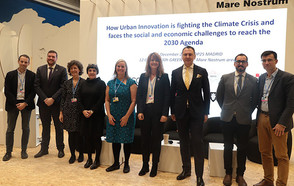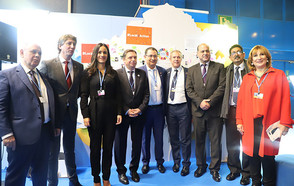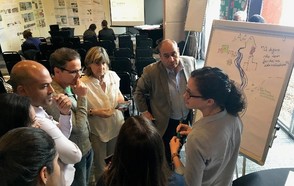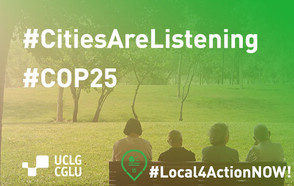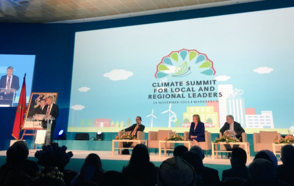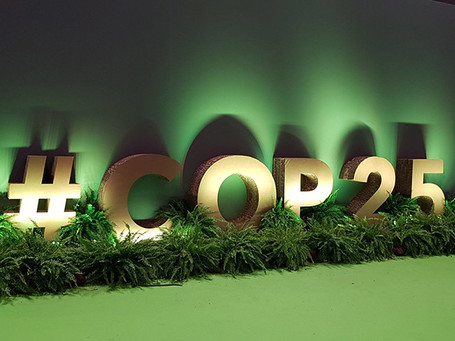
UCLG and LGMA at COP 25
UCLG acknowledges the efforts made by the full LGMA Constituency with ICLEI as focal point, and with the support of the Global Task Force members, such as Regions4, GCoM, Climate Chance, the Committee of the Regions of the European Union, as well as the UCLG Sections CEMR and UCLG Africa in particular.
The 25th Conference of the Parties (COP25) took place in Madrid from 2 to 13 December. COP25 was calling for Action NOW: the world actors need to grow the ambition for Climate action to save the planet, and this can only be made through a multilevel collaboration in the governance, as well as the implication of all stakeholders, including the citizens.
COP25 was calling for Action NOW: the world actors need to grow the ambition for Climate action to save the planet, and this can only be made through a multilevel collaboration in the governance, as well as the implication of all stakeholders, including the citizens.
As it is well known, and echoing the words of the Secretary General of the United Nations Antonio Guterres, the results have been disappointing in general terms as no agreement has been reached on the carbon market nor has the level of ambition been as high as expected. From the perspective of local and regional governments we have seen how many of the important references to multilevel collaboration and to cities have not been retained in the official outcome documents.
However there are also some important advances which give us hope as a constituency in the road towards Glasgow.
The first ever link between climate change and gender equality has been made within the COP Document. A clear link between science and policy is also in the map of the official documents and the involvement of all the stakeholders is signalled as critical paving the way for enhance recognition of local and regional governments work.
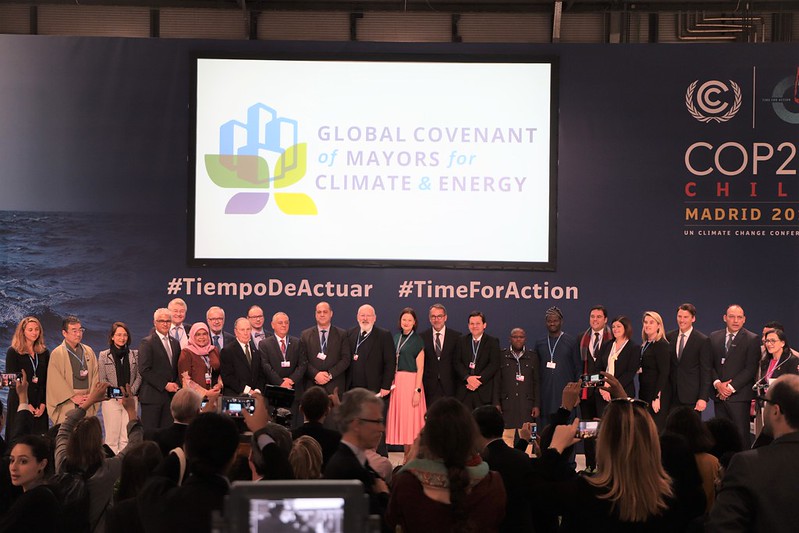
Furthermore there is international recognition of the high level of ambition that our constituency has demonstrated.
Facilitated by ICLEI as focal point, our constituency is organised as Local Governments and Municipal Authorities (LGMA). A delegation of over 100 local and regional governments representatives from 40 countries and over 20 networks was mobilised and actively participated at COP both as part of national delegations and as organisers of side events. The significant presence of Spanish local and regional governments is worth highlighting, with a permanent stand of the Federation of Spanish Municipalities and Provinces in the Green Zone, including the UCLG Vice-President for Europe and Mayor of Soria, Carlos Martínez Mínguez.
UCLG membership was an active part of the delegation and was represented at the highest level by President Dr. Mohamed Boudra. The European and African Sections also participated actively organising side events and as part of the LGMA delegations, as well as the events of the Global Covenant of Mayors (GCoM).
The LGMA produced a press release recalling:
“The need for a multilevel action by the constituency is successfully demonstrated by a strong and broad commitment to raise global climate ambition, and partnerships with the private sector across sectors and geographies. Local, regional and other subnational governments should be actively engaged by national governments in the preparation of the second NDCs throughout 2020. Therefore, on the road to Glasgow, local and regional governments are setting out six key priorities for the Constituency, which should be enabled and supported by national governments and all other actors.”
- You can read the full release here.
The constituency has further agreed 6 key priority areas of work towards Glasgow
- Raise the climate ambition of local and regional governments
- Ensure NDC vertical integration and transparency
- Localize climate finance
- Take a balanced approach to mitigation and adaptation
- Link climate to circular economy and nature
- Amplify global climate action
- See the full roadmap here.
From its side UCLG will work on linking the Climate and the SDG agenda as well as localizing in general. Furthermore, enhancing instruments of collaboration to ensure local and regional governments inputs to NDCs and promoting Local Determined Contributions (as promoted by the African Section UCLG Africa) will be critical parts of our work.
Four key moments are worth highlighting from a UCLG perspective:
Ministerial High-Level Segment on 10th December
Unifying to Accelerate Action to achieve the climate goals was the core message given at the Ministerial High-Level Segment, where the UCLG President, Dr. Mohamed Boudra, Mayor Al Hoceima delivered the statement on behalf of the LGMA constituency, calling on the international system to consider the call of local and regional governments, and build on their energy to boost the Nationally Determined Contributions that will be renewed in 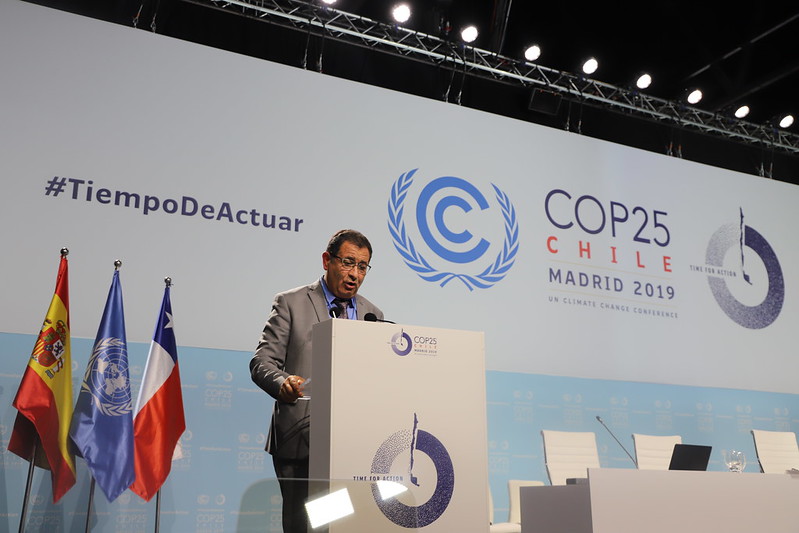 COP26, taking place in Glasgow in 2020.
COP26, taking place in Glasgow in 2020.
“There is no better word to define the situation: Climate Emergency. And there is no better place than that of the territories, and that of local governments to observe and the same time provide an answer to this climate emergency… the next ten years are our last opportunity.”
The President called for multilevel collaboration to be part of the process of the NDCs.
Local and regional governments from all over the world have demonstrated, time and time again, their commitment to work with national governments and to transform their own mobilizations into part of the national climate plans. Cities, he argued, are a part of the solution, and the place where concrete actions, close to our communities, can be implemented. He called for cities to be integral part of the process of the COP in Glasgow and beyond, not as NGOs, but as active participants.
FEMP- UCLG session on the 11th of December
High-Level International Dialogue of Local and Regional Governments for Climate Change, co-organised by FEMP and UCLG with the support of CEMR and the city of Madrid
With local officials from Spain, Chile, Peru, Scotland and Morocco this Dialogue allowed an exchange between the Spanish Government and local governments.
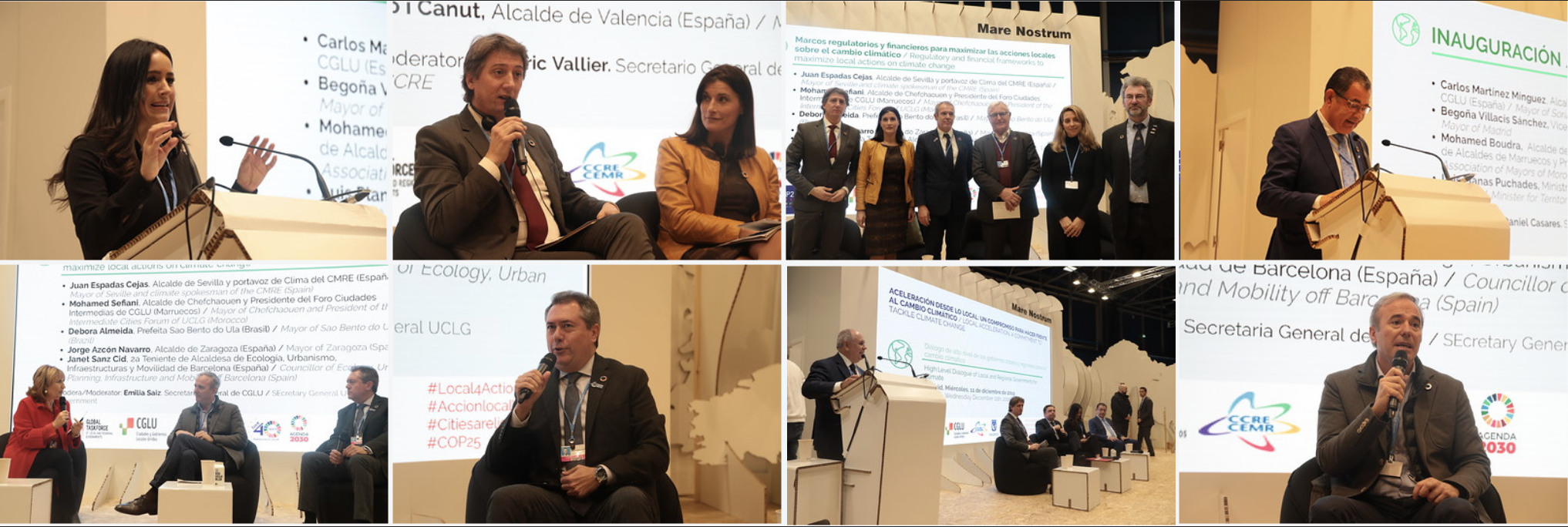
Minister Luis Planas stated that, "Local and regional governments are key to this process of change. Agenda 2030 reflects that all territories must be sustainable and for this we have to respond by cooperating together." (Minister for Territorial Policy and Civil Service)
Mayors called for local governments to be integrated into the decision-making processes of the COP, therefore the support of National Governments in this sense is key. "We are and will continue to be active partners in the development and implementation of national climate policy. Putting local service provision at the core of the discussion will allow us to give communities their rightful place as part of the solution and play our role as guardians of the universal agendas" Dr. Mohamed Boudra, Mayor of Al Hoceima, President of UCLG.
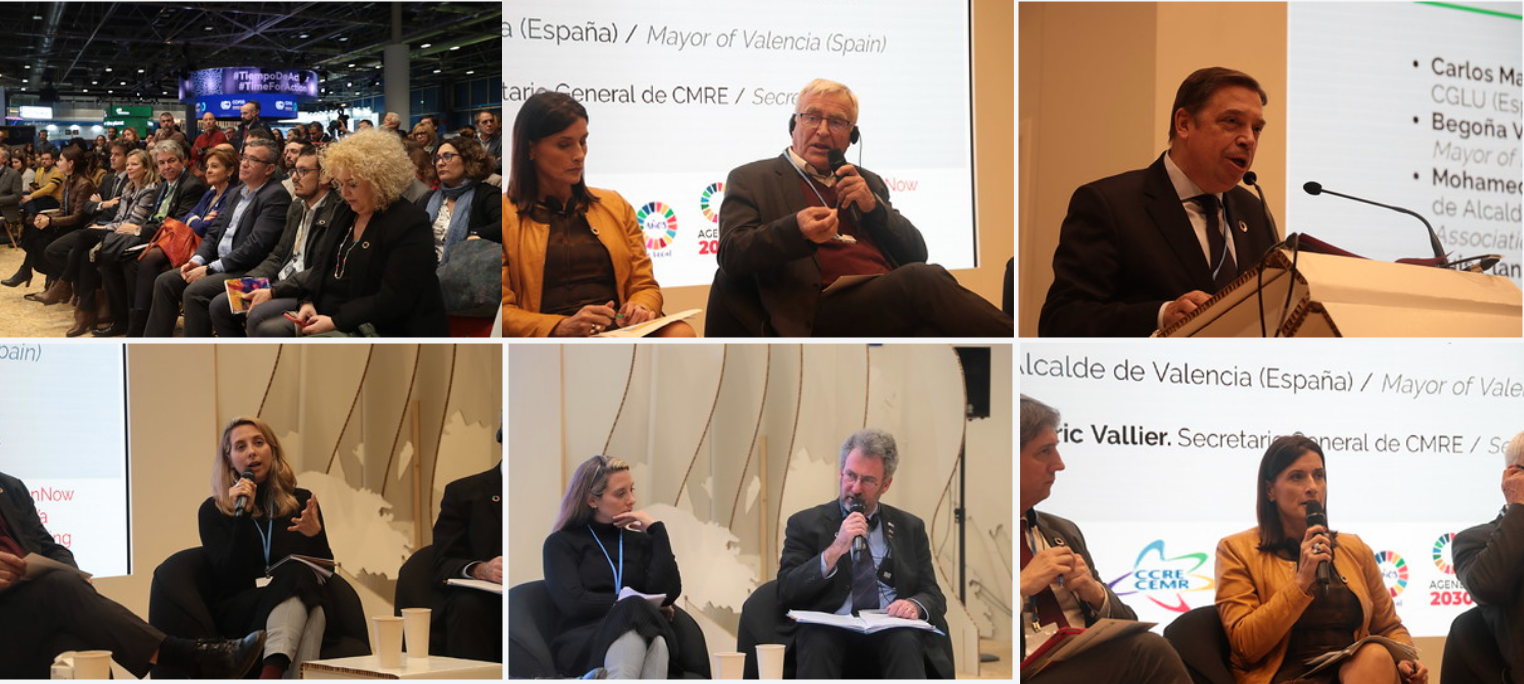
The panellists argued that only if we involve all stakeholders, and carry out climate actions from the bottom-up, will we be able to carry out the sustainable transformation of our cities that our communities, and planet, needs. A clear dialogue and collaboration between different spheres of governments will be critical to reach the level of ambitions needed.
- Read more the High-Level International Dialogue of Local and Regional Governments for Climate Change here
The preparation of the upcoming COP26 in Glasgow: a key process of this summit, held on the 10th of December
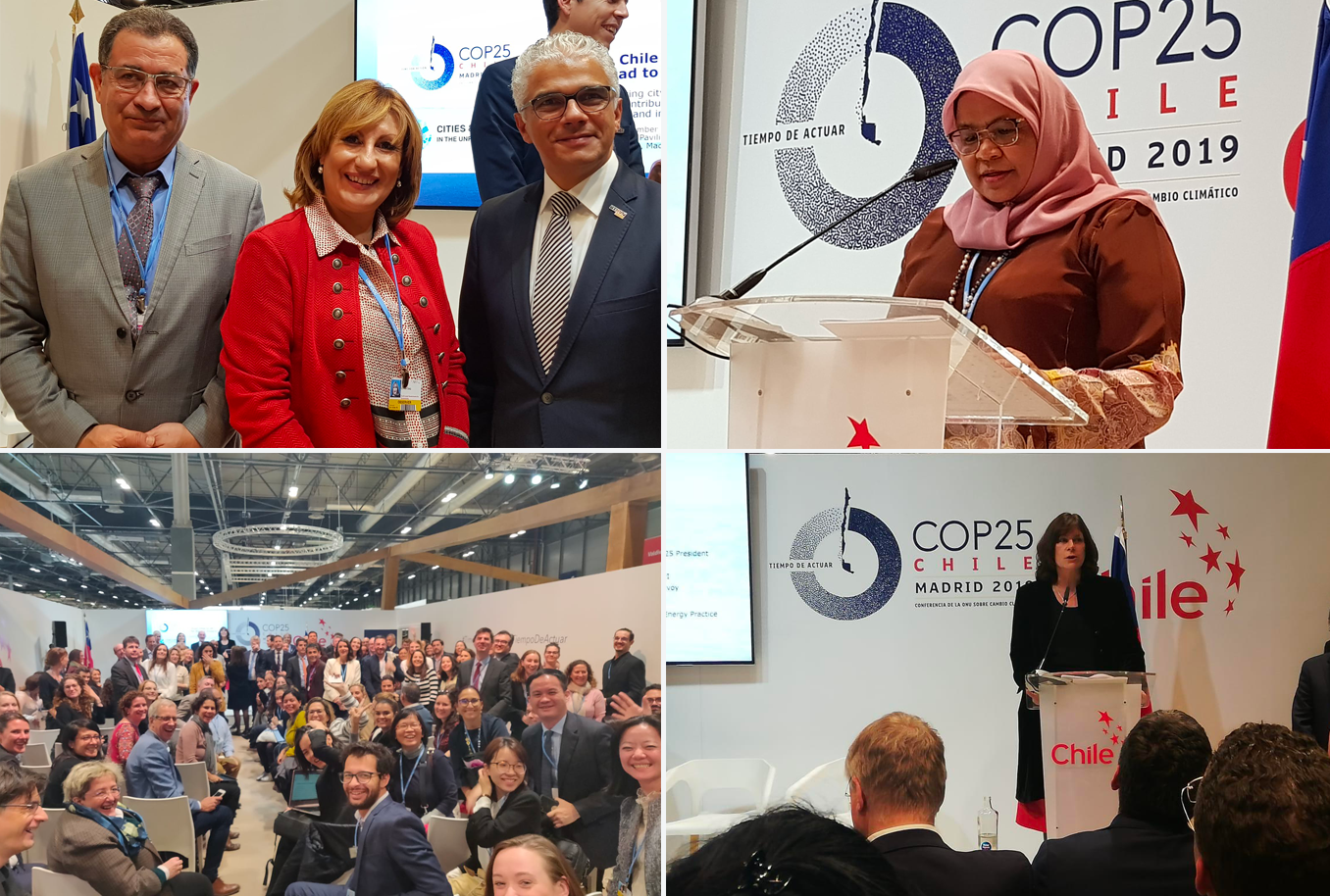 In the session titled “From Chile to UK, Roadmap to Glasgow”, participants argued that only if we think about the future generations will we be able to save the planet. “The only way that we can successfully fight the global Climate Emergency is to take an all of society approach.” Claire Perry O’Neill, COP26 President, Former UK Minister for Energy and Clean Growth.
In the session titled “From Chile to UK, Roadmap to Glasgow”, participants argued that only if we think about the future generations will we be able to save the planet. “The only way that we can successfully fight the global Climate Emergency is to take an all of society approach.” Claire Perry O’Neill, COP26 President, Former UK Minister for Energy and Clean Growth.
To do this, we need to bring everyone on board and address the climate emergency through a whole-of-government and a whole-of-society approach. Steven Heddle, climate spokesperson for COSLA, called for developing an adequate framework to meet the goals and allow cities and regions to develop their full potential. This was also supported by a member of the Global Taskforce: Regions4 Secretary General, Iñaki Susaeta, saying “We are glad that COP26 will be the COP for multi-governance. Regions4 and its 40 members around the world are ready to step up ambition and climate action.”
For the next decade of climate action, scaling up ambitions through a holistic approach that considers the on-the-ground reality of cities, could be one of the outcomes of the GCoM Day panels. This day took place under the motto “Accelerating Action and Scaling Up Impact”, and focused on how to co-create more efficient policies to unlock the potential of cities in the context of the climate emergency. Participants argued how to upscale the political engagement of local communities through a whole-of-society holistic approach.
“Think local - act global. Identify the problems, find the solutions from peers on the global stage here at COP25, and implement them at the local level" Maimunah Sharif, Executive Director of UN-Habitat. In this sense, the need of a local soft knowledge was highlighted by the panel on Research & Innovation.
Global Taskforce Session 6th of December
We need Multilevel trust to achieve the Climate Agenda, was the conclusion of the GTF session coordinated by UCLG, where representatives from C40, FMDV, ICLEI, UCLG Africa and Climate Chance Association contributed to the Global debate through messages of the Local Governments and Municipal Authorities constituency on climate finance and subnational involvement in the achievement of the Climate Agenda: the need to empower the local 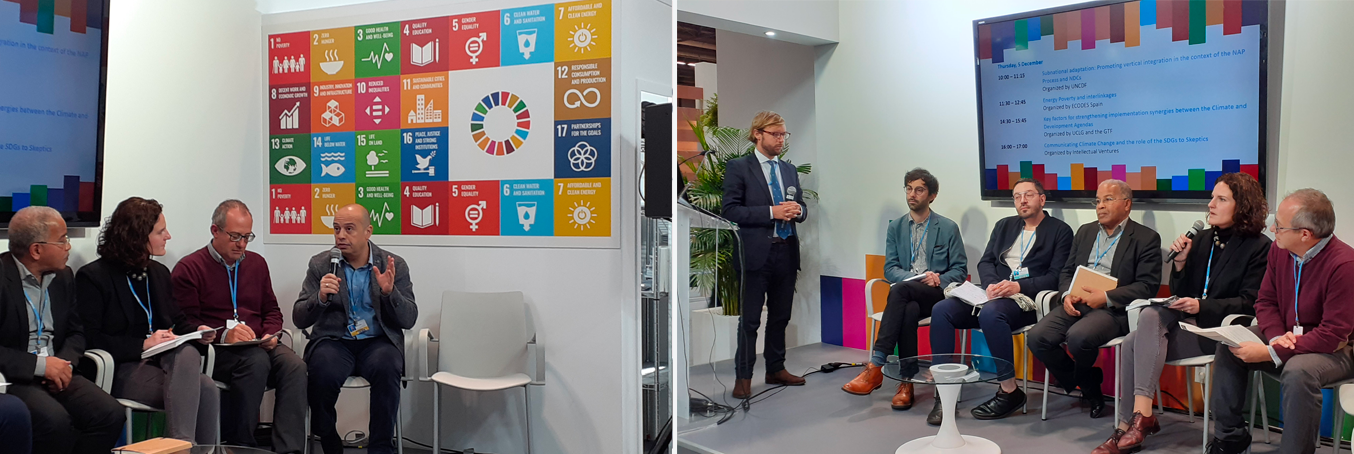 level through sufficient access to resources and the initiatives were deemed as necessary steps to localize and implement the climate agenda.
level through sufficient access to resources and the initiatives were deemed as necessary steps to localize and implement the climate agenda.
The biggest gaps were those of trust and access to finance between different levels of governance, and argued that only through a true climate co-creation process that involves all stakeholders will we be able to achieve the 1.5 ºC goal that our planet needs to curb the worst effects of climate change.
Urban Innovation for climate action
The session organized by Barcelona City Council was an opportunity to discuss the links between innovation and climate action, and to offer shared experiences on how cities and regions are bringing about innovative solutions to achieve our shared goals. Participants argued for a true overhaul on the definition of innovation, incorporating local communities, citizens and the private sector in the climate negotiations and in the decision-making processes.
 Members of our constituency argued for addressing the relationship between climate change and social inequality, how climate actions need to consider those that are most vulnerable, and how the 2030 Agenda can offer solutions to address the worst effects of climate change. An example of this urban solutions was the project Grow Smarter that highlighted three Lighthouse cities from Stockholm, Cologne and Barcelona showcasing Smart City solutions from advanced information and communication technology and better connected urban mobility, to incorporating renewable energy sources directly into the city’s supply network, especially emissions reduction in buildings, this sector being one the highest energy consumers.
Members of our constituency argued for addressing the relationship between climate change and social inequality, how climate actions need to consider those that are most vulnerable, and how the 2030 Agenda can offer solutions to address the worst effects of climate change. An example of this urban solutions was the project Grow Smarter that highlighted three Lighthouse cities from Stockholm, Cologne and Barcelona showcasing Smart City solutions from advanced information and communication technology and better connected urban mobility, to incorporating renewable energy sources directly into the city’s supply network, especially emissions reduction in buildings, this sector being one the highest energy consumers.
Finally, a shared sentiment across the room was that communities need to be effectively involved in all of the climate discussions, and in particular at the COP26 in Glasgow. No matter how many country negotiations take place behind closed doors, dialogue and political action among all spheres of government is critical, and we do consider integral, for effective climate action. Therefore, our constituency is already working to showcase our shared visions in the coming edition of the COP.
- Read more on the session led by Barcelona City Council here
Many other Local Dialogues on Climate were the occasion in which different spheres of government shared new ideas towards a joint climate action and called for specific measures to ensure the wellbeing of their communities. In particular, UCLG sections developed different sessions that called for specific mechanisms to localize climate action in the Cities and Regions: the need for more 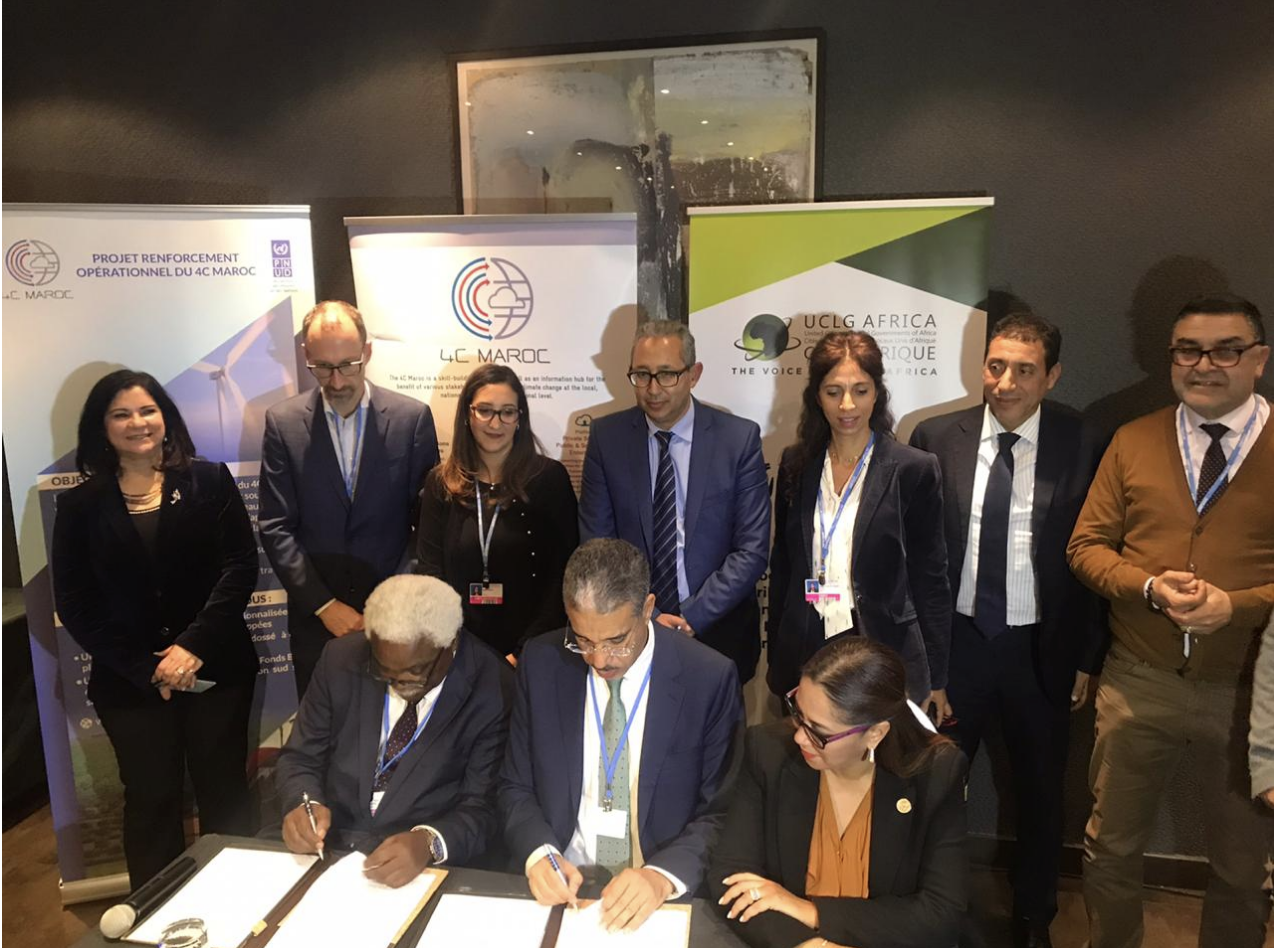 prerogatives, resources, and capacities was echoed during these sessions.
prerogatives, resources, and capacities was echoed during these sessions.
The mobilization of the African Continent at the COP was particularly notable. UCLG Africa pushed for the “Territorialisation” of the NDCs, through the creation of Locally Determined Contributions (LDCs) that would materialize a mechanism for local and regional governments to localize the financial means to act and achieve the climate agenda. The African local and regional governments delegation, during the meeting of the Africa Climate Taskforce, also signed an agreement with Centre 4C Morocco and Abdelaziz Rabbah, Minister for Energy and Sustainable Development with the presence of Nouzha Bouchareb, Minister of Territory and Urbanism: the agreement aimed at building capacity for the different types of actors involved in the issue of climate change, and strengthening local involvement in the process of implementation of the Paris Agreement.
- Read more UCLG Africa Newsletter
- See the intervention of Dr. Moamed Boudra, Mayor of Alchoceima and President of UCLG at COP25
- Read about the High-Level International Dialogue of Local and Regional Governments for Climate Change here
- Read more on the session led by Barcelona City Council here
- Relive the #Local4ActionNow moment
- See the Flickr album











